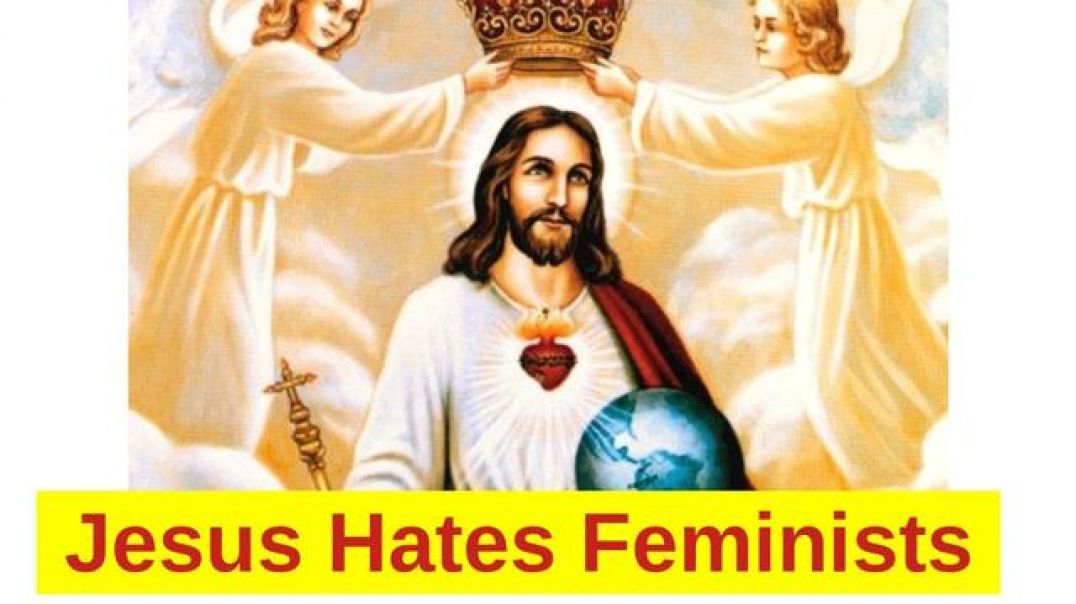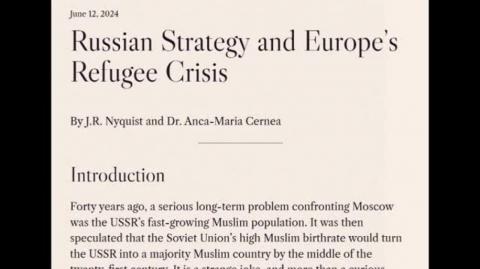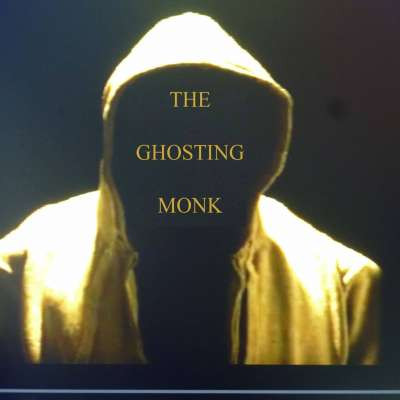Video Player
00:00
00:00
Jesus - "I Hate Feminists".
2
0
36 Просмотры
Опубликован в 08 Jul 2022 / В
Фильм и анимация
Показать больше
0



 Sant77
Sant77
 Ozmosis
Ozmosis
 Carioca Exilado
Carioca Exilado
 RedKnight
RedKnight


 Francis_UD
Francis_UD

 Timcast IRL
Timcast IRL
 TheQuartering
TheQuartering

 LiberumArbitrium
LiberumArbitrium

 Life_N_Times_of_Shane_T_Hanson
Life_N_Times_of_Shane_T_Hanson

 TheSaltyCracker
TheSaltyCracker
 mrghoster
mrghoster
 Doggk
Doggk
 Freshfit
Freshfit
 Donovan Sharpe
Donovan Sharpe

Log in to comment
8 1 Et cum aperuisset sigillum septimum, factum est silentium in cælo, quasi media hora.
2 Et vidi septem angelos stantes in conspectu Dei : et datæ sunt illis septem tubæ.
3 Et alius angelus venit, et stetit ante altare habens thuribulum aureum : et data sunt illi incensa multa, ut daret de orationibus sanctorum omnium super altare aureum, quod est ante thronum Dei.
4 Et ascendit fumus incensorum de orationibus sanctorum de manu angeli coram Deo.
5 Et accepit angelus thuribulum, et implevit illud de igne altaris, et misit in terram : et facta sunt tonitrua, et voces, et fulgura, et terræmotus magnus.
6 Et septem angeli, qui habebant septem tubas, præparaverunt se ut tuba canerent.
7 Et primus angelus tuba cecinit, et facta est grando, et ignis, mista in sanguine, et missum est in terram, et tertia pars terræ combusta est, et tertia pars arborum concremata est, et omne fœnum viride combustum est.
~~~~~~~~~~~~~~~~~~~~~~~~~~~~~~~~~~~~~~~~~~~~~~~~~~~
31 Cum autem venerit Filius hominis in majestate sua, et omnes angeli cum eo, tunc sedebit super sedem majestatis suæ :
32 et congregabuntur ante eum omnes gentes, et separabit eos ab invicem, sicut pastor segregat oves ab hædis :
33 et statuet oves quidem a dextris suis, hædos autem a sinistris.
34 Tunc dicet rex his qui a dextris ejus erunt : Venite benedicti Patris mei, possidete paratum vobis regnum a constitutione mundi :
35 esurivi enim, et dedistis mihi manducare : sitivi, et dedistis mihi bibere : hospes eram, et collegistis me :
36 nudus, et cooperuistis me : infirmus, et visitastis me : in carcere eram, et venistis ad me.
37 Tunc respondebunt ei justi, dicentes : Domine, quando te vidimus esurientem, et pavimus te : sitientem, et dedimus tibi potum ?
38 quando autem te vidimus hospitem, et collegimus te : aut nudum, et cooperuimus te ?
39 aut quando te vidimus infirmum, aut in carcere, et venimus ad te ?
40 Et respondens rex, dicet illis : Amen dico vobis, quamdiu fecistis uni ex his fratribus meis minimis, mihi fecistis.
41 Tunc dicet et his qui a sinistris erunt : Discedite a me maledicti in ignem æternum, qui paratus est diabolo, et angelis ejus :
42 esurivi enim, et non dedistis mihi manducare : sitivi, et non dedistis mihi potum :
43 hospes eram, et non collegistis me : nudus, et non cooperuistis me : infirmus, et in carcere, et non visitastis me.
44 Tunc respondebunt ei et ipsi, dicentes : Domine, quando te vidimus esurientem, aut sitientem, aut hospitem, aut nudum, aut infirmum, aut in carcere, et non ministravimus tibi ?
45 Tunc respondebit illis, dicens : Amen dico vobis : Quamdiu non fecistis uni de minoribus his, nec mihi fecistis.
46 Et ibunt hi in supplicium æternum : justi autem in vitam æternam.
[Apocalypsis 1]
[Revelation 1]
{1:1} Apocalypsis Iesu Christi, quam dedit illi Deus palam facere servis suis, quæ oportet fieri cito: et significavit, mittens per Angelum suum servo suo Ioanni,
{1:1} The Revelation of Jesus Christ, which God gave to him, in order to make known to his servants the things that must soon occur, and which he signified by sending his Angel to his servant John;
{1:2} qui testimonium perhibuit Verbo Dei, et testimonium Iesu Christi, quæcumque vidit.
{1:2} he has offered testimony to the Word of God, and whatever he saw is the testimony of Jesus Christ.
{1:3} Beatus, qui legit, et audit verba Prophetiæ huius: et servat ea, quæ in ea scripta sunt: tempus enim prope est.
{1:3} Blessed is he who reads or hears the words of this Prophecy, and who keeps the things that have been written in it. For the time is near.
~ Here is an example where the meaning of ‘et’ clearly corresponds to the English word ‘or’, not to the word ‘and’. These first three verses appear to have been added afterward by John’s disciples, when they were translating this book from the original Aramaic, in which John wrote, into Greek.
{1:4} Ioannes septem Ecclesiis, quæ sunt in Asia. Gratia vobis, et pax ab eo, qui est, et qui erat, et qui venturus est: et a septem Spiritibus, qui in conspectu throni eius sunt:
{1:4} John, to the seven Churches, which are in Asia. Grace and peace to you, from him who is, and who was, and who is to come, and from the seven spirits who are in the sight of his throne,
~ The seven Churches represent the universal Church on earth after the Orthodox and Protestant Churches repent (in the late 2010's) and unite with the Catholic Church (in the early 2020's) as one Catholic Church with seven divisions within unity: one part for the Latin Rite, one part for the Eastern Churches (within which there may still be separate sui juris churches), and five parts for the formerly Protestant Churches. These seven are also represented in the Gospels by the seven baskets full of fragments, and by the fives loaves and two fish, at the two miracles of the loaves.
{1:5} et a Iesu Christo, qui est testis fidelis, primogenitus mortuorum, et princeps regum terræ, qui dilexit nos, et lavit nos a peccatis nostris in sanguine suo,
{1:5} and from Jesus Christ, who is the faithful witness, the first-born of the dead, and the leader over the kings of the earth, who has loved us and has washed us from our sins with his blood,
{1:6} et fecit nos regnum, et sacerdotes Deo et Patri suo: ipsi gloria, et imperium in sæcula sæculorum: Amen.
{1:6} and who has made us into a kingdom and into priests for God and for his Father. To him be glory and dominion forever and ever. Amen.
~ Here the word ‘et’ is translated as ‘and’ but actually has a slightly different meaning; it does not mean that God and the Father are two completely different things. It means ‘God and [especially/specifically] his Father.’
{1:7} Ecce venit cum nubibus, et videbit eum omnis oculus, et qui eum pupugerunt. Et plangent se super eum omnes tribus terræ: Etiam: Amen.
{1:7} Behold, he arrives with the clouds, and every eye shall see him, even those who pierced him. And all the tribes of the earth shall lament for themselves over him. Even so. Amen.
~ Christ will return bodily, descending visibly from the sky, just as at his Ascension he ascended visibly into the sky and then invisibly into Heaven. His return will not be in secret. When Christ returns, all will see and know, throughout the world, even those who pierced him by crucifying His Church.
{1:8} Ego sum α, et ω, principium, et finis, dicit Dominus Deus: qui est, et qui erat, et qui venturus est, omnipotens.
{1:8} “I am the Alpha and the Omega, the Beginning and the End,” says the Lord God, who is, and who was, and who is to come, the Almighty.
~ John originally wrote the Book of Revelation in Aramaic (see my article on this point). And when Christ spoke to John saying 'I am the Alpha and the Omega' he probably did not speak in Greek, but in Aramaic or Hebrew. So the words Alpha and Omega are a translation. So this sentence becomes either, in Aramaic, “I am the Alap and the Tau,” or, in Hebrew, “I am the Aleph and the Tof.”
{1:9} Ego Ioannes frater vester, et particeps in tribulatione, et regno et patientia in Christo Iesu: fui in insula, quæ appellatur Patmos propter Verbum Dei, et testimonium Iesu:
{1:9} I, John, your brother, and a sharer in the tribulation and in the kingdom and in patient endurance for Christ Jesus, was on the island which is called Patmos, because of the Word of God and the testimony to Jesus.
~ John was on Patmos, in my chronology, in the early A.D. 80's, beginning about A.D. 82, for about 2 or 3 years or so. He was put there by the emperor Domitian, who had first tried to have John killed. John was placed in a pot of boiling oil. All the other 11 of the 12 Apostles (Matthias replacing Judas) had already been martyred. But John was not martyred. When he came out of the boiling oil, he was unharmed and looked refreshed, as if he had just taken a bath in water, rather than boiling oil. So the emperor, unaffected by this miracle, exiled John to Patmos, where other Christians also had been exiled, working in the copper mines there. John became a target of Domitian because John had, some years earlier, written the Gospel of John.
{1:10} Fui in Spiritu in Dominica die, et audivi post me vocem magnam tamquam tubæ,
{1:10} I was in the Spirit on the Lord’s day, and I heard behind me a great voice, like that of a trumpet,
{1:11} dicentis: Quod vides, scribe in libro: et mitte septem Ecclesiis, quæ sunt in Asia, Epheso, et Smyrnæ, et Pergamo, et Thyatiræ, et Sardis, et Philadelphiæ, et Laodiciæ:
{1:11} saying, “What you see, write in a book, and send it to the seven Churches, which are in Asia: to Ephesus, and to Smyrna, and to Pergamus, and to Thyatira, and to Sardis, and to Philadelphia, and to Laodicea.”
{1:12} Et conversus sum ut viderem vocem, quæ loquebatur mecum: Et conversus vidi septem candelabra aurea:
{1:12} And I turned around, so as to see the voice which was speaking with me. And having turned around, I saw seven golden lampstands.
{1:13} et in medio septem candelabrorum aureorum, similem Filio hominis, vestitum podere, et præcinctum ad mamillas zona aurea:
{1:13} And in the midst of the seven golden lampstands was one resembling the Son of man, clothed to the feet with a vestment, and wrapped to the breast with a wide belt of gold.
{1:14} caput autem eius, et capilli erant candidi tamquam lana alba, et tamquam nix, et oculi eius tamquam flamma ignis,
{1:14} But his head and hair were bright, like white wool, or like snow; and his eyes were like a flame of fire;
{1:15} et pedes eius similes aurichalco, sicut in camino ardenti, et vox illius tamquam vox aquarum multarum:
{1:15} and his feet resembled shining brass, just as in a burning furnace; and his voice was like the voice of many waters.
{1:16} et habebat in dextera sua stellas septem: et de ore eius gladius utraque parte acutus exibat: et facies eius sicut sol lucet in virtute sua.
{1:16} And in his right hand, he held the seven stars; and from his mouth went out a sharp two-edged sword; and his face was like the sun, shining with all its might.
{1:17} Et cum vidissem eum, cecidi ad pedes eius tamquam mortuus. Et posuit dexteram suam super me, dicens: Noli timere: ego sum primus, et novissimus,
{1:17} And when I had seen him, I fell at his feet, like one who is dead. And he laid his right hand upon me, saying: “Do not be afraid. I am the First and the Last.
{1:18} et vivus, et fui mortuus, et ecce sum vivens in sæcula sæculorum, et habeo claves mortis, et inferni.
{1:18} And I am alive, though I was dead. And, behold, I live forever and ever. And I hold the keys of death and of Hell.
{1:19} Scribe ergo quæ vidisti, et quæ sunt, et quæ oportet fieri post hæc.
{1:19} Therefore, write the things which you have seen, and which are, and which must occur afterward:
{1:20} Sacramentum septem stellarum, quas vidisti in dextera mea, et septem candelabra aurea: septem stellæ Angeli sunt septem Ecclesiarum: et candelabra septem, septem Ecclesiæ sunt.
{1:20} the mystery of the seven stars, which you have seen in my right hand, and of the seven golden lampstands. The seven stars are the Angels of the seven Churches, and the seven lampstands are the seven Churches.”
[Apocalypsis 2]
[Revelation 2]
{2:1} Et Angelo Ephesi Ecclesiæ scribe: Hæc dicit, qui tenet septem stellas in dextera sua, qui ambulat in medio septem candelabrorum aureorum:
{2:1} “And to the Angel of the Church of Ephesus write: Thus says the One who holds the seven stars in his right hand, who walks in the midst of the seven golden lampstands:
~ The seven stars are the seven parts into which the Church will be restructured in the early 2020's, when the Orthodox Church and all the Protestant Churches repent and unite with the Catholic Church. There will be seven divisions within unity. This passage refers primarily to those seven parts of the Church.
{2:2} Scio opera tua, et laborem, et patientiam tuam, et quia non potes sustinere malos: et tentasti eos, qui se dicunt Apostolos esse, et non sunt: et invenisti eos mendaces:
{2:2} I know your works, and your hardship and patient endurance, and that you cannot stand those who are evil. And so, you have tested those who declare themselves to be Apostles and are not, and you have found them to be liars.
{2:3} et patientiam habes, et sustinuisti propter nomen meum, et non defecisti.
{2:3} And you have patient endurance for the sake of my name, and you have not fallen away.
{2:4} Sed habeo adversum te, quod charitatem tuam primam reliquisti.
{2:4} But I have this against you: that you have relinquished your first charity.
~ This could mean that charity is no longer first among these Christians, or that they no longer have charity to the degree that they had at first. Or both.
{2:5} Memor esto itaque unde excideris: et age pœnitentiam, et prima opera fac. Sin autem, venio tibi, et movebo candelabrum tuum de loco suo, nisi pœnitentiam egeris.
{2:5} And so, call to mind the place from which you have fallen, and do penance, and do the first works. Otherwise, I will come to you and remove your lampstand from its place, unless you repent.
{2:6} Sed hoc habes, quia odisti facta Nicolaitarum, quæ et ego odi.
{2:6} But this you have, that you hate the deeds of the Nicolaitans, which I also hate.
~ The Nicolaitans were an early heretical group. They took their name from one of the first seven Deacons, but he was never a part of the group, he did not establish it, and he would not have approved of it. They were know for sexual promiscuity. This group foreshadows groups in the present and near future. For example, there are the Society of Saint Pius X, who take their name from Pope Pius X, but he was never a part of the group, he did not establish it, and he would not have approved of it. And in the future, there will be groups that push for women deacons. The Church will approve of the ordination of women deacons, but the deeds of those who demand women deacons are hateful to God.
{2:7} Qui habet aurem, audiat quid Spiritus dicat Ecclesiis: Vincenti dabo edere de ligno vitæ, quod est in Paradiso Dei mei.
{2:7} Whoever has an ear, let him hear what the Spirit says to the Churches. To him who prevails, I will give to eat from the Tree of Life, which is in the Paradise of my God.
{2:8} Et Angelo Smyrnæ Ecclesiæ scribe: Hæc dicit primus, et novissimus, qui fuit mortuus, et vivit:
{2:8} And to the Angel of the Church of Smyrna write: Thus says the First and the Last, he who was dead and now lives:
{2:9} Scio tribulationem tuam, et paupertatem tuam, sed dives es: et blasphemaris ab his, qui se dicunt Iudæos esse, et non sunt, sed sunt synagoga Satanæ.
{2:9} I know your tribulation and your poverty, but you are rich, and that you are blasphemed by those who declare themselves to be Jews and are not, but who are a synagogue of Satan.
~ This reference to Jews who are associated with Satan refers to the fact that, in the second part of the tribulation, during the time of the Antichrist in the distant future, a significant number of Jews will follow the Antichrist. But later many of these will repent of this sin and will convert and follow Christ. It is those Jews who are a synagogue of Satan, and who will blaspheme against the true Christians of that time. But some devout Jews during that time will not follow the Antichrist at all, but will recognize that he is evil.
{2:10} Nihil horum timeas quæ passurus es. Ecce missurus est diabolus aliquos ex vobis in carcerem ut tentemini: et habebitis tribulationem diebus decem. Esto fidelis usque ad mortem, et dabo tibi coronam vitæ.
{2:10} You should fear nothing amid those things which you will suffer. Behold, the devil will cast some of you into prison, so that you may be tested. And you will have tribulation for ten days. Be faithful even unto death, and I will give to you the crown of life.
{2:11} Qui habet aurem, audiat quid Spiritus dicat Ecclesiis: Qui vicerit, non lædetur a morte secunda.
{2:11} Whoever has an ear, let him hear what the Spirit says to the Churches. Whoever will prevail, he shall not be harmed by the second death.
{2:12} Et Angelo Pergami Ecclesiæ scribe: Hæc dicit, qui habet rhomphæam utraque parte acutam:
{2:12} And to the Angel of the Church of Pergamus write: Thus says he who holds the sharp two-edged spear:
~ Notice that the Latin word here means 'spear,' not 'sword.'
{2:13} Scio ubi habitas, ubi sedes est Satanæ: et tenes nomen meum, et non negasti fidem meam. Et in diebus illis Antipas testis meus fidelis, qui occisus est apud vos, ubi Satanas habitat.
{2:13} I know where you dwell, where the seat of Satan is, and that you hold to my name and have not denied my faith, even in those days when Antipas was my faithful witness, who was slain among you, where Satan dwells.
{2:14} Sed habeo adversus te pauca: quia habes illic tenentes doctrinam Balaam, qui docebat Balac mittere scandalum coram filiis Israel, edere, et fornicari:
{2:14} But I have a few things against you. For you have, in that place, those who hold to the doctrine of Balaam, who instructed Balak to cast a stumbling block before the sons of Israel, to eat and to commit fornication.
{2:15} ita habes et tu tenentes doctrinam Nicolaitarum.
{2:15} And you also have those who hold to the doctrine of the Nicolaitans.
{2:16} Similiter pœnitentiam age: si quo minus veniam tibi cito, et pugnabo cum illis in gladio oris mei.
{2:16} So do penance to the same extent. If you do less, I will come to you quickly and I will fight against these ones with the sword of my mouth.
{2:17} Qui habet aurem, audiat quid Spiritus dicat Ecclesiis: Vincenti dabo manna absconditum, et dabo illi calculum candidum: et in calculo nomen novum scriptum, quod nemo scit, nisi qui accipit.
{2:17} Whoever has an ear, let him hear what the Spirit says to the Churches. To him who prevails, I will give the hidden manna. And I will give to him a white emblem, and on the emblem, a new name has been written, which no one knows, except the one who receives it.
{2:18} Et Angelo Thyatiræ Ecclesiæ scribe: Hæc dicit Filius Dei, qui habet oculos tamquam flammam ignis, et pedes eius similes aurichalco:
{2:18} And to the Angel of the Church of Thyatira write: Thus says the Son of God, who has eyes like a flame of fire, and his feet are like shining brass.
{2:19} Novi opera tua, et fidem, et charitatem tuam, et ministerium, et patientiam tuam, et opera tua novissima plura prioribus.
{2:19} I know your works, and your faith and charity, and your ministry and patient endurance, and that your more recent works are greater than the earlier ones.
{2:20} Sed habeo adversus te pauca: quia permittis mulierem Iezabel, quæ se dicit propheten, docere, et seducere servos meos, fornicari, et manducare de idolothytis.
{2:20} But I have a few things against you. For you permit the woman Jezebel, who calls herself a prophetess, to teach and to seduce my servants, to commit fornication and to eat the food of idolatry.
~ In the Church today and in the near future, the role of women will continue to be a problem, with some groups and religious leaders giving women roles that are contrary to the will of God. This will particularly be a problem in the 2020's, when the Protestant Churches are united with the Catholic Church. There are many women ministers and many men used to the idea of women pastors among some Protestant groups. Also, sexual ethics are looser in Protestant theology than in Catholic theology.
{2:21} Et dedi illi tempus ut pœnitentiam ageret: et non vult pœnitere a fornicatione sua.
{2:21} And I gave her a time, so that she might do penance, but she is not willing to repent from her fornication.
{2:22} Ecce mittam eam in lectum: et qui mœchantur cum ea, in tribulatione maxima erunt, nisi pœnitentiam ab operibus suis egerint.
{2:22} Behold, I will cast her onto a bed, and those who commit adultery with her shall be in a very great tribulation, unless they repent from their works.
~ The first part of the tribulation will be more severe for those who are more sinful.
{2:23} Et filios eius interficiam in morte, et scient omnes Ecclesiæ, quia ego sum scrutans renes, et corda: et dabo unicuique vestrum secundum opera sua. Vobis autem dico,
{2:23} And I will put her sons to death, and all the Churches shall know that I am the one who examines temperaments and hearts. And I will give to each one of you according to your works. But I say to you,
~ Her 'sons' are those who follow her heretical teachings. This may also refer to soldiers dying in warfare, because it is generally young men who are sent to war.
{2:24} et ceteris qui Thyatiræ estis: Quicumque non habent doctrinam hanc, et qui non cognoverunt altitudines Satanæ, quemadmodum dicunt, non mittam super vos aliud pondus:
{2:24} and to the others who are at Thyatira: Whoever does not hold to this doctrine, and who has not 'known the depths of Satan,' as they say, I will not set any other weight upon you.
{2:25} tamen id, quod habetis, tenete donec veniam.
{2:25} Even so, that which you have, hold on to it until I return.
{2:26} Et qui vicerit, et custodierit usque in finem opera mea, dabo illi potestatem super gentes,
{2:26} And whoever will prevail and will observe my works even unto the end, I will give to him authority over the nations.
{2:27} et reget eas in virga ferrea, et tamquam vas figuli confringentur,
{2:27} And he shall rule them with an iron rod, and they shall be broken like the earthenware of a potter.
{2:28} sicut et ego accepi a Patre meo: et dabo illi stellam matutinam.
{2:28} The same I also have received from my Father. And I will give to him the morning star.
{2:29} Qui habet aurem, audiat quid Spiritus dicat Ecclesiis.
{2:29} Whoever has an ear, let him hear what the Spirit says to the Churches.”
[Apocalypsis 3]
[Revelation 3]
{3:1} Et Angelo Ecclesiæ Sardis scribe: Hæc dicit qui habet septem Spiritus Dei, et septem stellas: Scio opera tua, quia nomen habes quod vivas, et mortuus es.
{3:1} “And to the Angel of the Church of Sardis write: Thus says he who has the seven spirits of God and the seven stars: I know your works, that you have a name which is alive, but you are dead.
{3:2} Esto vigilans, et confirma cetera, quæ moritura erant. Non enim invenio opera tua plena coram Deo meo.
{3:2} Be vigilant, and confirm the things that remain, lest they soon die out. For I do not find your works to be full in the sight of my God.
{3:3} In mente ergo habe qualiter acceperis, et audieris, et serva, et pœnitentiam age. Si ergo non vigilaveris, veniam ad te tamquam fur, et nescies qua hora veniam ad te.
{3:3} Therefore, keep in mind the way that you have received and heard, and then observe it and repent. But if you will not be vigilant, I will come to you like a thief, and you will not know at what hour I will come to you.
{3:4} Sed habes pauca nomina in Sardis, qui non inquinaverunt vestimenta sua: et ambulabunt mecum in albis, quia digni sunt.
{3:4} But you have a few names in Sardis who have not defiled their garments. And these shall walk with me in white, because they are worthy.
{3:5} Qui vicerit, sic vestietur vestimentis albis, et non delebo nomen eius de Libro vitæ, et confitebor nomen eius coram Patre meo, et coram Angelis eius.
{3:5} Whoever prevails, so shall he be clothed in white vestments. And I will not delete his name from the Book of Life. And I will confess his name in the presence of my Father and in the presence of his Angels.
{3:6} Qui habet aurem, audiat quid Spiritus dicat Ecclesiis.
{3:6} Whoever has an ear, let him hear what the Spirit says to the Churches.
{3:7} Et Angelo Philadelphiæ Ecclesiæ scribe: Hæc dicit Sanctus et Verus, qui habet clavem David: qui aperit, et nemo claudit: claudit, et nemo aperit:
{3:7} And to the Angel of the Church of Philadelphia write: Thus says the Holy One, the True One, he who holds the key of David. He opens and no one closes. He closes and no one opens.
~ Since ancient languages, such as Hebrew, Latin, and Greek, had no punctuation and no spaces between words, words like ‘and’ sometimes functioned like punctuation and spaces. So a translation need not translate every instance of the word ‘and,’ as long as the meaning is preserved.
{3:8} Scio opera tua. Ecce dedi coram te ostium apertum, quod nemo potest claudere: quia modicam habes virtutem, et servasti verbum meum, et non negasti nomen meum.
{3:8} I know your works. Behold, I have set an open door before you, which no one is able to close. For you have little power, and you have observed my word, and you have not denied my name.
~ The meaning of ‘virtutem’ here must be power and not virtue, because, having observed Christ’s word and having not denied his name, they could not have little virtue, but they could still have little worldly power.
{3:9} Ecce dabo de synagoga Satanæ, qui dicunt se Iudæos esse, et non sunt, sed mentiuntur: Ecce faciam illos ut veniant, et adorent ante pedes tuos: et scient quia ego dilexi te
{3:9} Behold, I will take from the synagogue of Satan those who declare themselves to be Jews and are not, for they are lying. Behold, I will cause them to approach and to reverence before your feet. And they shall know that I have loved you.
{3:10} quoniam servasti verbum patientiæ meæ, et ego servabo te ab hora tentationis, quæ ventura est in orbem universum tentare habitantes in terra.
{3:10} Since you have kept the word of my patient endurance, I also will keep you from the hour of temptation, which shall overcome the whole world in order to test those living upon the earth.
{3:11} Ecce venio cito: tene quod habes, ut nemo accipiat coronam tuam.
{3:11} Behold, I am approaching quickly. Hold on to what you have, so that no one may take your crown.
{3:12} Qui vicerit, faciam illum columnam in Templo Dei mei, et foras non egredietur amplius: et scribam super eum nomen Dei mei, et nomen civitatis Dei mei novæ Ierusalem, quæ descendit de cælo a Deo meo, et nomen meum novum.
{3:12} Whoever prevails, I will set him as a column in the temple of my God, and he shall not depart from it anymore. And I will write upon him the name of my God, and the name of the city of my God, the new Jerusalem that descends out of heaven from my God, and my new name.
{3:13} Qui habet aurem, audiat quid Spiritus dicat Ecclesiis.
{3:13} Whoever has an ear, let him hear what the Spirit says to the Churches.
{3:14} Et Angelo Laodiciæ Ecclesiæ scribe: Hæc dicit Amen, testis fidelis, et verus, qui est Principium creaturæ Dei.
{3:14} And to the Angel of the Church of Laodicea write: Thus says the Amen, the faithful and true Witness, who is the Beginning of the creation of God:
{3:15} Scio opera tua: quia neque frigidus es, neque calidus: utinam frigidus esses, aut calidus:
{3:15} I know your works: that you are neither cold, nor hot. I wish that you were either cold or hot.
{3:16} sed quia tepidus es, et nec frigidus, nec calidus, incipiam te evomere ex ore meo.
{3:16} But because you are lukewarm and are neither cold nor hot, I will begin to vomit you out of my mouth.
{3:17} Quia dicis: quod dives sum, et locupletatus, et nullius egeo: et nescis quia tu es miser, et miserabilis, et pauper, et cæcus, et nudus.
{3:17} For you declare, ‘I am wealthy, and I have been enriched further, and I have need of nothing.’ And you do not know that you are wretched, and miserable, and poor, and blind, and naked.
{3:18} Suadeo tibi emere a me aurum ignitum probatum ut locuples fias, et vestimentis albis induaris, et non appareat confusio nuditatis tuæ, et collyrio inunge oculos tuos ut videas.
{3:18} I urge you to buy from me gold, tested by fire, so that you may be enriched and may be clothed in white vestments, and so that the shame of your nakedness may disappear. And anoint your eyes with an eye salve, so that you may see.
{3:19} Ego quos amo, arguo, et castigo. Æmulare ergo, et pœnitentiam age.
{3:19} Those whom I love, I rebuke and chastise. Therefore, be zealous and do penance.
{3:20} Ecce sto ad ostium, et pulso: si quis audierit vocem meam, et aperuerit mihi ianuam, intrabo ad illum, et cœnabo cum illo, et ipse mecum.
{3:20} Behold, I stand at the door and knock. If anyone will hear my voice and will open the door to me, I will enter to him, and I will dine with him, and he with me.
{3:21} Qui vicerit, dabo ei sedere mecum in throno meo: sicut et ego vici, et sedi cum patre meo in throno eius.
{3:21} Whoever prevails, I will grant to him to sit with me on my throne, just as I also have overcome and have sat down with my Father on his throne.
{3:22} Qui habet aurem, audiat quid Spiritus dicat Ecclesiis.
{3:22} Whoever has an ear, let him hear what the Spirit says to the Churches.”
[Apocalypsis 4]
[Revelation 4]
{4:1} Post hæc vidi: et ecce ostium apertum in cælo, et vox prima, quam audivi tamquam tubæ loquentis mecum, dicens: Ascende huc, et ostendam tibi quæ oportet fieri post hæc.
{4:1} After these things, I saw, and behold, a door was opened in heaven, and the voice that I heard speaking with me first was like a trumpet, saying: “Ascend to here, and I will reveal to you what must occur after these things.”
{4:2} Et statim fui in Spiritu: et ecce sedes posita erat in cælo, et supra sedem sedens.
{4:2} And immediately I was in the Spirit. And behold, a throne had been placed in heaven, and there was One sitting upon the throne.
{4:3} Et qui sedebat similis erat aspectui lapidis iaspidis, et sardinis: et iris erat in circuitu sedis similis visioni smaragdinæ.
{4:3} And the One who was sitting there was similar in appearance to a stone of jasper and sardius. And there was an iridescence surrounding the throne, in aspect similar to an emerald.
~ The word ‘iris’ is not translated as ‘rainbow’ in this context because a rainbow is not similar to an emerald. The word ‘iris’ can also refer to an iridescent stone, which could well be similar to an emerald.
{4:4} Et in circuitu sedis sedilia vigintiquattuor: et super thronos vigintiquattuor seniores sedentes, circumamicti vestimentis albis, et in capitibus eorum coronæ aureæ:
{4:4} And surrounding the throne were twenty-four smaller thrones. And upon the thrones, twenty-four elders were sitting, clothed entirely in white vestments, and on their heads were gold crowns.
{4:5} Et de throno procedebant fulgura, et voces, et tonitrua: et septem lampades ardentes ante thronum, qui sunt septem spiritus Dei.
{4:5} And from the throne, lightnings and voices and thunders went forth. And there were seven burning lamps before the throne, which are the seven spirits of God.
{4:6} Et in conspectu sedis tamquam mare vitreum simile crystallo: et in medio sedis, et in circuitu sedis quattuor animalia plena oculis ante et retro.
{4:6} And in view of the throne, there was something that seemed like a sea of glass, similar to crystal. And in the middle of the throne, and all around the throne, there were four living creatures, full of eyes in front and in back.
{4:7} Et animal primum simile leoni, et secundum animal simile vitulo, et tertium animal habens faciem quasi hominis, et quartum animal simile aquilæ volanti.
{4:7} And the first living creature resembled a lion, and the second living creature resembled a calf, and the third living creature had a face like a man, and the fourth living creature resembled a flying eagle.
~ The lion is the Gospel of Matthew, because Matthew wrote in Judea, for the Christians of Judea who converted from Judaism, which is represented by a lion, and the lion from the tribe of Judah is Christ, who led them from Judaism to Christianity. The calf is the Gospel of Mark, because Mark wrote in Rome, for the Christians who were Romans; they are represented by a calf because as Romans they used to worship false gods (analogous to the molten calf in Exodus), but now they sacrifice to God according to true worship. The living creature with a face like a man is Gospel of Luke, because Luke was a Gentile convert and who wrote in a Gentile nation for the Gentile converts (such as Theophilus); they are represented by the face of a man because Christ called them from being mere men apart from God to the fullness of humanity revealed only by Christ. The eagle is Gospel of John, because John’s Gospel soared above the earth with its profound and heavenly insights into the Gospel, which are beyond the reach of mere human reason and ability.
{4:8} Et quattuor animalia, singula eorum habebant alas senas: et in circuitu, et intus plena sunt oculis: et requiem non habebant die ac nocte, dicentia: Sanctus, Sanctus, Sanctus Dominus Deus omnipotens, qui erat, et qui est, et qui venturus est.
{4:8} And each of the four living creatures had upon them six wings, and all around and within they are full of eyes. And they took no rest, day or night, from saying: “Holy, Holy, Holy is the Lord God Almighty, who was, and who is, and who is to come.”
{4:9} Et cum darent illa animalia gloriam, et honorem, et benedictionem sedenti super thronum, viventi in sæcula sæculorum,
{4:9} And while those living creatures were giving glory and honor and blessings to the One sitting upon the throne, who lives forever and ever,
{4:10} procidebant vigintiquattuor seniores ante sedentem in throno, et adorabant viventem in sæcula sæculorum, et mittebant coronas suas ante thronum, dicentes:
{4:10} the twenty-four elders fell prostrate before the One sitting upon the throne, and they adored him who lives forever and ever, and they cast their crowns before the throne, saying:
{4:11} Dignus es Domine Deus noster accipere gloriam, et honorem, et virtutem: quia tu creasti omnia, et propter voluntatem tuam erant, et creata sunt.
{4:11} “You are worthy, O Lord our God, to receive glory and honor and power. For you have created all things, and they became and were created because of your will.”
[Apocalypsis 5]
[Revelation 5]
{5:1} Et vidi in dextera sedentis supra thronum, librum scriptum intus et foris, signatum sigillis septem.
{5:1} And in the right hand of the One sitting upon the throne, I saw a book, written inside and out, sealed with seven seals.
{5:2} Et vidi Angelum fortem, prædicantem voce magna: Quis est dignus aperire librum, et solvere signacula eius?
{5:2} And I saw a strong Angel, proclaiming with a great voice, “Who is worthy to open the book and to break its seals?”
{5:3} Et nemo poterat neque in cælo, neque in terra, neque subtus terram aperire librum, neque respicere illum.
{5:3} And no one was able, neither in heaven, nor on earth, nor under the earth, to open the book, nor to gaze upon it.
{5:4} Et ego flebam multum, quoniam nemo dignus inventus est aperire librum, nec videre eum.
{5:4} And I wept greatly because no one was found worthy to open the book, nor to see it.
{5:5} Et unus de senioribus dixit mihi: Ne fleveris: ecce vicit leo de tribu Iuda, radix David, aperire librum, et solvere septem signacula eius.
{5:5} And one of the elders said to me: “Weep not. Behold, the lion from the tribe of Judah, the root of David, has prevailed to open the book and to break its seven seals.”
{5:6} Et vidi: et ecce in medio throni et quattuor animalium, et in medio seniorum, Agnum stantem tamquam occisum, habentem cornua septem, et oculos septem: qui sunt septem spiritus Dei, missi in omnem terram.
{5:6} And I saw, and behold, in the midst of the throne and the four living creatures, and in the midst of the elders, a Lamb was standing, as if it were slain, having seven horns and seven eyes, which are the seven spirits of God, sent forth to all the earth.
{5:7} Et venit: et accepit de dextera sedentis in throno librum.
{5:7} And he approached and received the book from the right hand of the One sitting upon the throne.
{5:8} Et cum aperuisset librum, quattuor animalia, et vigintiquattuor seniores ceciderunt coram Agno, habentes singuli citharas, et phialas aureas plenas odoramentorum, quæ sunt orationes sanctorum:
{5:8} And when he had opened the book, the four living creatures and the twenty-four elders fell down before the Lamb, each having stringed instruments, as well as golden bowls full of fragrances, which are the prayers of the saints.
{5:9} et cantabant canticum novum, dicentes: Dignus es Domine accipere librum, et aperire signacula eius: quoniam occisus es, et redemisti nos Deo in sanguine tuo ex omni tribu, et lingua, et populo, et natione:
{5:9} And they were singing a new canticle, saying: “O Lord, you are worthy to receive the book and to open its seals, because you were slain and have redeemed us for God, by your blood, from every tribe and language and people and nation.
{5:10} et fecisti nos Deo nostro regnum, et sacerdotes: et regnabimus super terram.
{5:10} And you have made us into a kingdom and into priests for our God, and we shall reign over the earth.”
{5:11} Et vidi, et audivi vocem Angelorum multorum in circuitu throni, et animalium, et seniorum: et erat numerus eorum millia millium,
{5:11} And I saw, and I heard the voice of many Angels surrounding the throne and the living creatures and the elders, (and their number was thousands of thousands)
{5:12} dicentium voce magna: Dignus est Agnus, qui occisus est, accipere virtutem, et divinitatem, et sapientiam, et fortitudinem, et honorem, et gloriam, et benedictionem.
{5:12} saying with a great voice: “The Lamb who was slain is worthy to receive power, and divinity, and wisdom, and strength, and honor, and glory, and blessing.”
{5:13} Et omnem creaturam, quæ in cælo est, et super terram, et sub terra, et quæ sunt in mari, et quæ in eo: omnes audivi dicentes: Sedenti in throno, et Agno: benedictio, et honor, et gloria, et potestas in sæcula sæculorum.
{5:13} And every creature that is in heaven, and on earth, and under the earth, and all that is within the sea: I heard them all saying: “To the One sitting upon the throne and to the Lamb be blessing, and honor, and glory, and authority, forever and ever.”
~ Here the sea is a figure of Purgatory.
{5:14} Et quattuor animalia dicebant: Amen. Et vigintiquattuor seniores ceciderunt in facies suas: et adoraverunt viventem in sæcula sæculorum.
{5:14} And the four living creatures were saying, “Amen.” And the twenty-four elders fell down on their faces, and they adored the One who lives forever and ever.
~ The use of the imperfect tense indicates that the four living creatures were saying ‘Amen’ over and over again.
[Apocalypsis 6]
[Revelation 6]
{6:1} Et vidi quod aperuisset Agnus unum de septem sigillis, et audivi unum de quattuor animalibus, dicens, tamquam vocem tonitrui: Veni, et vide.
{6:1} And I saw that the Lamb had opened one of the seven seals. And I heard one of the four living creatures saying, in a voice like thunder: “Draw near and see.”
{6:2} Et vidi: et ecce equus albus, et qui sedebat super illum habebat arcum, et data est ei corona, et exivit vincens ut vinceret.
{6:2} And I saw, and behold, a white horse. And he who was sitting upon it was holding a bow, and a crown was given to him, and he went forth conquering, so that he might prevail.
~ The first Seal is the first horseman of the Apocalypse. The first four Seals are grouped together, by being represented each by one of four horsemen, because they are a related series of events. The first horseman is World War III.
{6:3} Et cum aperuisset sigillum secundum, audivi secundum animal, dicens: Veni, et vide.
{6:3} And when he had opened the second seal, I heard the second living creature saying: “Draw near and see.”
{6:4} Et exivit alius equus rufus: et qui sedebat super illum, datum est ei ut sumeret pacem de terra, et ut invicem se interficiant, et datus est ei gladius magnus.
{6:4} And another horse went forth, which was red. And it was granted to him who was sitting upon it that he would take peace from the earth, and that they would kill one another. And a great sword was given to him.
~ The second Seal is the second horseman of the Apocalypse, which is severe worldwide civil violence and disorder.
{6:5} Et cum aperuisset sigillum tertium, audivi tertium animal, dicens: Veni, et vide. Et ecce equus niger: et qui sedebat super illum, habebat stateram in manu sua.
{6:5} And when he had opened the third seal, I heard the third living creature saying: “Draw near and see.” And behold, a black horse. And he who was sitting upon it was holding a balance in his hand.
~ The third Seal and the third horseman is the great famine of the 21st century, which begins about the time of World War 3. This famine will not end until all the Protestant Churches, and the Orthodox Church, repent and unite with the Catholic Church in one holy unified Church with seven parts. This is the famine predicted by Jesus in the parable of the Prodigal Son.
{6:6} Et audivi tamquam vocem in medio quattuor animalium dicentium: Bilibris tritici denario, et tres bilibres hordei denario, et vinum, et oleum ne læseris.
{6:6} And I heard something like a voice in the midst of the four living creatures saying, “A double measure of wheat for a denarius, and three double measures of barley for a denarius, but do no harm to wine and oil.”
~ This verse says that a denarius (a day's pay) will buy one double measure of wheat, but three double measures of barley. During Biblical times, wheat was the grain of the wealthy, and barley was the food of the poor. Therefore, this famine will be unusual, because it will be more severe in wealthy nations and less severe in poor nations. Wine and oil were luxury items during the time that these verses were written. The wealthy nations will lack basic necessities like food, but will have various kinds of modern day luxury items. The famine will be most severe in the wealthy nations of Europe because of the war; it will afflict the United States with a lesser severity. Third world and developing nations will be less affected, because they grow their food locally and they are not as affected by the war.
~ A libra is an ancient Greek unit of weight equaling about 11 or 12 ounces; so a bilibra is about 23 ounces of weight.
{6:7} Et cum aperuisset sigillum quartum, audivi vocem quarti animalis dicentis: Veni, et vide.
{6:7} And when he had opened the fourth seal, I heard the voice of the fourth living creature saying: “Draw near and see.”
~ The fourth Seal and the fourth horseman is the set of results from the war and the civil unrest and the famine, especially, but not limited to, death from a variety of different causes. The devastating effects of these first three Seals is the fourth Seal, for war and violence and famine have lasting effects, making people more susceptible to disease, causing extreme poverty, joblessness, homelessness, and economic ruin, and many other consequences. But these shall be tempered by the mercy of God.
{6:8} Et ecce equus pallidus: et qui sedebat super eum, nomen illi Mors, et infernus sequebatur eum, et data est illi potestas super quattuor partes terræ, interficere gladio, fame, et morte, et bestiis terræ.
{6:8} And behold, a pale horse. And he who was sitting upon it, his name was Death, and Hell was following him. And authority was given to him over the four parts of the earth, to destroy by the sword, by famine, and by death, and by the creatures of the earth.
{6:9} Et cum aperuisset sigillum quintum: vidi subtus altare animas interfectorum propter verbum Dei, et propter testimonium, quod habebant,
{6:9} And when he had opened the fifth seal, I saw, under the altar, the souls of those who had been slain because of the Word of God and because of the testimony that they held.
~ The fifth Seal is not a fifth horseman, because now the war and the civil unrest and the famine have ended, though their effects linger on. The fifth Seal is a great persecution and martyrdom of Christians in the occupied territories by the Arab/Muslim extremists. Do not blame this massacre on all Muslims, nor on all Arabs, but only on the extremists who are now drunk with power. God gave them victory in the war because of the sins of the nations that they conquered; but they now act as if they were gods, deciding life and death. This massacre will be like the Jewish Holocaust, except that it will be mostly Christians who are put to death. This Christian Holocaust will be even more severe than the Jewish Holocaust. The worst of this massacre occurs during the latter part of the occupation.
{6:10} et clamabant voce magna, dicentes: Usquequo Domine, (sanctus, et verus) non iudicas, et non vindicas sanguinem nostrum de iis, qui habitant in terra?
{6:10} And they were crying out with a loud voice, saying: “How long, O Holy and True Lord, will you not judge and not vindicate our blood against those who dwell upon the earth?”
{6:11} Et datæ sunt illis singulæ stolæ albæ: et dictum est illis ut requiescerent adhuc tempus modicum donec compleantur conservi eorum, et fratres eorum, qui interficiendi sunt sicut et illi.
{6:11} And white robes were given to each of them. And they were told that they should rest for a brief time, until their fellow servants and their brothers, who were to be slain even as they were slain, would be completed.
{6:12} Et vidi cum aperuisset sigillum sextum: et ecce terræmotus magnus factus est, et sol factus est niger tamquam saccus cilicinus: et luna tota facta est sicut sanguis:
{6:12} And when he had opened the sixth seal, I saw, and behold, a great earthquake occurred. And the sun became black, like a haircloth sack, and the entire moon became like blood.
~ The sixth Seal is World War IV. This war is started by the Allied (free) nations because the extremists have been killing millions of Christians, and because now that they have many nuclear missiles there is nothing to stop them from nuking and conquering the free nations. The Allies develop a nuclear weapon with very little radioactivity (pure fusion weapons). They attack the extremists in a nuclear first strike. They also attack with massive air and naval power. The extremists reply with nuclear missiles. This war is the most devastating war that the human race has ever seen. Very many nuclear weapons are used by both sides. The great monarch is the preeminent leader among the Allies. He has the blessing of the Pope. His troops are few and holy. The Allies call upon the help of God and of His Angels. Otherwise, they would not succeed.
{6:13} et stellæ de cælo ceciderunt super terram, sicut ficus emittit grossos suos cum a vento magno movetur.
{6:13} And the stars from heaven fell upon the earth, just as when a fig tree, shaken by a great wind, drops its immature figs.
{6:14} Et cælum recessit sicut liber involutus: et omnis mons, et insulæ de locis suis motæ sunt:
{6:14} And heaven receded, like a scroll being rolled up. And every mountain, and the islands, were moved from their places.
{6:15} et reges terræ, et principes, et tribuni, et divites, et fortes, et omnis servus, et liber absconderunt se in speluncis, et in petris montium:
{6:15} And the kings of the earth, and the rulers, and the military leaders, and the wealthy, and the strong, and everyone, servant and free, hid themselves in caves and among the rocks of the mountains.
{6:16} et dicunt montibus, et petris: Cadite super nos, et abscondite nos a facie sedentis super thronum, et ab ira Agni:
{6:16} And they said to the mountains and the rocks: “Fall over us and hide us from the face of the One sitting upon the throne, and from the wrath of the Lamb.
{6:17} quoniam venit dies magnus iræ ipsorum: et quis poterit stare?
{6:17} For the great day of their wrath has arrived. And who will be able to stand?”
[Apocalypsis 7]
[Revelation 7]
{7:1} Post hæc vidi quattuor Angelos stantes super quattuor angulos terræ, tenentes quattuor ventos terræ ne flarent super terram, neque super mare, neque in ullam arborem.
{7:1} After these things, I saw four Angels standing above the four corners of the earth, holding the four winds of the earth, so that they would not blow upon the earth, nor upon the sea, nor upon any tree.
{7:2} Et vidi alterum Angelum ascendentem ab ortu solis, habentem signum Dei vivi: et clamavit voce magna quattuor Angelis, quibus datum est nocere terræ, et mari,
{7:2} And I saw another Angel ascending from the rising of the sun, having the Seal of the living God. And he cried out, in a great voice, to the four Angels to whom it was given to harm the earth and the sea,
{7:3} dicens: Nolite nocere terræ, et mari, neque arboribus, quoadusque signemus servos Dei nostri in frontibus eorum.
{7:3} saying: “Do no harm to the earth, nor to the sea, nor to the trees, until we seal the servants of our God on their foreheads.”
{7:4} Et audivi numerum signatorum, centum quadraginta quattuor millia signati, ex omni tribu filiorum Israel.
{7:4} And I heard the number of those who were sealed: one hundred and forty-four thousand sealed, out of every tribe of the sons of Israel.
~ The number sealed is symbolic, not literal. The seal of God is an external sign on the forehead, for most persons the Cross, and internal graces, and providential protection from the final afflictions of the first part of the tribulation.
~ Presently (Nov. 2006), only one person on earth (that I know of) has the Seal: the Angelic Shepherd (Fr. Sudac). The rest of those sealed will be sealed towards the end of World War IV (which is the sixth of the seven seals) about the year 2037. Not every faithful Catholic Christian will be sealed. Many who are in a state of grace will not be sealed. Only certain faithful souls receive the seal. I do not know how they are chosen by God, but they will be mostly Catholic Christians. Those without the seal can still go to Heaven.
{7:5} Ex tribu Iuda duodecim millia signati: Ex tribu Ruben duodecim millia signati: Ex tribu Gad duodecim millia signati:
{7:5} From the tribe of Judah, twelve thousand were sealed. From the tribe of Reuben, twelve thousand were sealed. From the tribe of Gad, twelve thousand were sealed.
{7:6} Ex tribu Aser duodecim millia signati: Ex tribu Nephthali duodecim millia signati: Ex tribu Manasse duodecim millia signati:
{7:6} From the tribe of Asher, twelve thousand were sealed. From the tribe of Naphtali, twelve thousand were sealed. From the tribe of Manasseh, twelve thousand were sealed.
{7:7} Ex tribu Simeon duodecim millia signati: Ex tribu Levi duodecim millia signati: Ex tribu Issachar duodecim millia signati:
{7:7} From the tribe of Simeon, twelve thousand were sealed. From the tribe of Levi, twelve thousand were sealed. From the tribe of Issachar, twelve thousand were sealed.
{7:8} Ex tribu Zabulon duodecim millia signati: Ex tribu Ioseph duodecim millia signati: Ex tribu Beniamin duodecim millia signati.
{7:8} From the tribe of Zebulun, twelve thousand were sealed. From the tribe of Joseph, twelve thousand were sealed. From the tribe of Benjamin, twelve thousand were sealed.
{7:9} Post hæc vidi turbam magnam, quam dinumerare nemo poterat ex omnibus gentibus, et tribubus, et populis, et linguis: stantes ante thronum, et in conspectu Agni, amicti stolis albis, et palmæ in manibus eorum:
{7:9} After these things, I saw a great crowd, which no one could number, from all the nations and tribes and peoples and languages, standing before the throne and in sight of the Lamb, clothed in white robes, with palm branches in their hands.
{7:10} et clamabant voce magna, dicentes: Salus Deo nostro, qui sedet super thronum, et Agno.
{7:10} And they cried out, with a great voice, saying: “Salvation is from our God, who sits upon the throne, and from the Lamb.”
~ The ones with the Seal on their foreheads are the holy servants of God who are spared from most of the remaining afflictions; these are relatively few, since they can be numbered. But the ones without the seal are the great crowd, which no one could number; these go through the remaining afflictions, and very many of them will die. But they can still be saved by enduring these afflictions with God’s grace. They are the larger number, so large that they cannot be counted.
{7:11} Et omnes Angeli stabant in circuitu throni, et seniorum, et quattuor animalium: et ceciderunt in conspectu throni in facies suas, et adoraverunt Deum,
{7:11} And all the Angels were standing around the throne, with the elders and the four living creatures. And they fell upon their faces in view of the throne, and they worshipped God,
{7:12} dicentes: Amen. Benedictio, et claritas, et sapientia, et gratiarum actio, honor, et virtus, et fortitudo Deo nostro in sæcula sæculorum, Amen.
{7:12} saying: “Amen. Blessing and glory and wisdom and thanksgiving, honor and power and strength to our God, forever and ever. Amen.”
{7:13} Et respondit unus de senioribus, et dixit mihi: Hi, qui amicti sunt stolis albis, qui sunt? et unde venerunt?
{7:13} And one of the elders responded and said to me: “These ones who are clothed in white robes, who are they? And where did they come from?”
{7:14} Et dixi illi: Domine mi, tu scis. Et dixit mihi: Hi sunt, qui venerunt de tribulatione magna, et laverunt stolas suas, et dealbaverunt eas in sanguine Agni.
{7:14} And I said to him, “My lord, you know.” And he said to me: “These are the ones who have come out of the great tribulation, and they have washed their robes and have made them white by the blood of the Lamb.
{7:15} Ideo sunt ante thronum Dei, et serviunt ei die ac nocte in templo eius: et qui sedet in throno, habitabit super illos:
{7:15} Therefore, they are before the throne of God, and they serve him, day and night, in his temple. And the One who sits upon the throne shall dwell over them.
{7:16} non esurient, neque sitient amplius, nec cadet super illos sol, neque ullus æstus:
{7:16} They shall not hunger, nor shall they thirst, anymore. Neither shall the sun beat down upon them, nor any heat.
{7:17} quoniam Agnus, qui in medio throni est, reget illos, et deducet eos ad vitæ fontes aquarum, et absterget Deus omnem lacrymam ab oculis eorum.
{7:17} For the Lamb, who is in the midst of the throne, will rule over them, and he will lead them to the fountains of the waters of life. And God will wipe away every tear from their eyes.”
[Apocalypsis 8]
[Revelation 8]
{8:1} Et cum aperuisset sigillum septimum, factum est silentium in cælo, quasi media hora.
{8:1} And when he had opened the seventh seal, there was silence in heaven for about half an hour.
{8:2} Et vidi septem Angelos stantes in conspectu Dei: et datæ sunt illis septem tubæ.
{8:2} And I saw seven Angels standing in the sight of God. And seven trumpets were given to them.
~ The length of time for the silence is figurative, because heaven is timeless.
{8:3} Et alius Angelus venit, et stetit ante altare habens thuribulum aureum: et data sunt illi incensa multa, ut daret de orationibus sanctorum omnium super altare aureum, quod est ante thronum Dei.
{8:3} And another Angel approached, and he stood before the altar, holding a golden censer. And much incense was given to him, so that he might offer upon the golden altar, which is before the throne of God, the prayers of all the saints.
{8:4} Et ascendit fumus incensorum de orationibus sanctorum de manu Angeli coram Deo.
{8:4} And the smoke of the incense of the prayers of the saints ascended, in the presence of God, from the hand of the Angel.
{8:5} Et accepit Angelus thuribulum aureum, et implevit illud de igne altaris, et misit in terram, et facta sunt tonitrua, et voces, et fulgura, et terræmotus magnus.
{8:5} And the Angel received the golden censer, and he filled it from the fire of the altar, and he cast it down upon the earth, and there were thunders and voices and lightnings and a great earthquake.
{8:6} Et septem Angeli, qui habebant septem tubas, præparaverunt se ut tuba canerent.
{8:6} And the seven Angels who hold the seven trumpets prepared themselves, in order to sound the trumpet.
{8:7} Et primus Angelus tuba cecinit, et facta est grando, et ignis, mista in sanguine, et missum est in terram, et tertia pars terræ combusta est, et tertia pars arborum concremata est, et omne fœnum viride combustum est.
{8:7} And the first Angel sounded the trumpet. And there came hail and fire, mixed with blood; and it was cast down upon the earth. And a third part of the earth was burned, and a third part of the trees was entirely burned up, and all the green plants were burned.
~ In the year 2038, a comet which has broken into pieces (probably Comet Tempel I) will approach the earth. Many of its medium and smaller sized pieces will fall to the earth. Comets are frozen like hail, but they burn with fire as they pass through the atmosphere. This event will affect a third of the earth's inhabited land mass. An extremely large number of human lives will be lost, along with great destruction to society, to plants and animals, and to the environment in general. The phrase 'green plants' refers to newly sprouting plants, since 'viride' can refer specifically to newly green plants, i.e. plants that have recently sprouted. So not all greenery is destroyed.
{8:8} Et secundus Angelus tuba cecinit: et tamquam mons magnus igne ardens missus est in mare, et facta est tertia pars maris sanguis,
{8:8} And the second Angel sounded the trumpet. And something like a great mountain, burning with fire, was cast down into the sea. And a third part of the sea became like blood.
{8:9} et mortua est tertia pars creaturæ eorum, quæ habebant animas in mari, et tertia pars navium interiit.
{8:9} And a third part of the creatures that were living in the sea died. And a third part of the ships were destroyed.
~ One of the larger pieces of this comet will fall into the ocean. This will cause great devastation at sea and will cause huge tidal waves to inundate areas near the shore. Very many more human lives will be lost; very many ships and many cities will be utterly destroyed; many fish will die.
{8:10} Et tertius Angelus tuba cecinit: et cecidit de cælo stella magna, ardens tamquam facula, et cecidit in tertiam partem fluminum, et in fontes aquarum:
{8:10} And the third Angel sounded the trumpet. And a great star fell from heaven, burning like a torch. And it fell upon a third part of the rivers and upon the sources of water.
{8:11} et nomen stellæ dicitur Absinthium; et facta est tertia pars aquarum in absinthium: et multi hominum mortui sunt de aquis, quia amaræ factæ sunt.
{8:11} And the name of the star is called Wormwood. And a third part of the waters were turned into wormwood. And many men died from the waters, because they were made bitter.
~ This star burning like a torch refers to the radioactive fallout from certain nuclear weapons (those made using plutonium or uranium) used in World War IV (the Sixth Seal). Radioactivity from nuclear weapons takes time to rise up into the upper atmosphere, to circulate around the world, and then to fall slowly to earth. Once this occurs, during and after World War IV, radioactivity will be found in the oceans, especially the Atlantic, and on the land. However, the main source of the radioactivity at this time is the events of the first two Trumpets. The fires caused by the first Trumpet raise radioactive material from the land into the atmosphere, where it is next removed from the atmosphere by rain. Thus it makes numerous sources of water unusable. Then the second Trumpet strikes the ocean, causing a huge quantity of ocean water, with its radioactivity, to be raised up into the atmosphere. Again, it falls back to the earth's surface in rainwater. As a result, very many human lives will be lost, due to the radioactivity in the water.
{8:12} Et quartus Angelus tuba cecinit: et percussa est tertia pars solis, et tertia pars lunæ, et tertia pars stellarum, ita ut obscuraretur tertia pars eorum, et diei non luceret pars tertia, et noctis similiter.
{8:12} And the fourth Angel sounded the trumpet. And a third part of the sun, and a third part of the moon, and a third part of the stars were struck, in such a way that a third part of them was obscured. And a third part of the day did not shine, and similarly the night.
~ This decrease in the amount of light coming from the Sun and moon and stars is caused by a nuclear winter, which results not only from World War IV (an all-out nuclear war), but also from the huge number of fires caused by the falling pieces of the comet.
{8:13} Et vidi, et audivi vocem unius aquilæ volantis per medium cæli, dicentis voce magna: Væ, væ, væ habitantibus in terra de ceteris vocibus trium Angelorum, qui erant tuba canituri.
{8:13} And I saw, and I heard the voice of a lone eagle flying through the midst of heaven, calling with a great voice: “Woe, Woe, Woe, to the inhabitants of the earth, from the remaining voices of the three Angels, who will soon sound the trumpet!”
[Apocalypsis 9]
[Revelation 9]
{9:1} Et quintus Angelus tuba cecinit: et vidi stellam de cælo cecidisse in terram, et data est ei clavis putei abyssi.
{9:1} And the fifth Angel sounded the trumpet. And I saw upon the earth, a star that had fallen from heaven, and the key to the well of the abyss was given to him.
~ Notice that the pluperfect tense is used, ‘had fallen.’ The fifth Angel is a holy angel, but when he sounds the trumpet, a key is given to a fallen angel to open the gates of Hell. It is surprising that a fallen angel has this role.
{9:2} Et aperuit puteum abyssi: et ascendit fumus putei, sicut fumus fornacis magnæ: et obscuratus est sol, et aer de fumo putei:
{9:2} And he opened the well of the abyss. And the smoke of the well ascended, like the smoke of a great furnace. And the sun and the air were obscured by the smoke of the well.
{9:3} Et de fumo putei exierunt locustæ in terram, et data est illis potestas, sicut habent potestatem scorpiones terræ:
{9:3} And locusts went forth from the smoke of the well into the earth. And power was given to them, like the power that the scorpions of the earth have.
{9:4} et præceptum est illis ne læderent fœnum terræ, neque omne viride, neque omnem arborem: nisi tantum homines, qui non habent signum Dei in frontibus suis.
{9:4} And it was commanded of them that they must not harm the plants of the earth, nor anything green, nor any tree, but only those men who do not have the Seal of God upon their foreheads.
{9:5} Et datum est illis ne occiderent eos: sed ut cruciarent mensibus quinque: et cruciatus eorum, ut cruciatus scorpii cum percutit hominem.
{9:5} And it was given to them that they would not kill them, but that they would torture them for five months. And their torture was like the torture of a scorpion, when he strikes a man.
{9:6} Et in diebus illis quærent homines mortem, et non invenient eam: et desiderabunt mori, et fugiet mors ab eis.
{9:6} And in those days, men will seek death and they will not find it. And they will desire to die, and death will flee from them.
~ These 'locusts' are not real locusts, but rather some type of supernatural affliction figuratively referred to as locusts. This affliction comes from the 'well of the abyss,' that is, from Hell. These figurative locusts are not a result of the previous Seals or Trumpets; it is not the affliction of radioactive fallout, nor of nuclear winter, nor of any natural disaster, nor of any man-made weapon. The five months of this affliction occurs from late 2038 to early 2039. I believe that the exact length of time is 153 days, from Nov. 8 of 2038 to April 9th of 2039, inclusive.
~ The three woes are the fifth, sixth, and seventh Trumpets, each of which differs from the previous Trumpets and Seals because the woes are the result, not of natural disasters, nor of human actions, but of the intervention of God and of angels. Therefore, the fifth Trumpet is not the result of events of nature, nor of human endeavor.
{9:7} Et similitudines locustarum, similes equis paratis in prælium: et super capita earum tamquam coronæ similes auro: et facies earum tamquam facies hominum.
{9:7} And the likenesses of the locusts resembled horses prepared for battle. And upon their heads were something like crowns similar to gold. And their faces were like the faces of men.
{9:8} Et habebant capillos sicut capillos mulierum: et dentes earum, sicut dentes leonum erant:
{9:8} And they had hair like the hair of women. And their teeth were like the teeth of lions.
{9:9} et habebant loricas sicut loricas ferreas, et vox alarum earum sicut vox curruum equorum multorum currentium in bellum:
{9:9} And they had breastplates like iron breastplates. And the noise of their wings was like the noise of many running horses, rushing to battle.
{9:10} et habebant caudas similes scorpionum, et aculei erant in caudis earum: et potestas earum nocere hominibus mensibus quinque:
{9:10} And they had tails similar to scorpions. And there were stingers in their tails, and these had the power to harm men for five months.
{9:11} et habebant super se regem Angelum abyssi, cui nomen Hebraice Abaddon, Græce autem Apollyon, Latine habens nomen Exterminans.
{9:11} And they had over them a king, the Angel of the abyss, whose name in Hebrew is Doom; in Greek, Destroyer; in Latin, Exterminator.
~ Notice how much more informative it is for the reader to have the translation of the words (Doom, Destroyer, Exterminator), rather than merely the Hebrew, Greek, and Latin names untranslated.
{9:12} Væ unum abiit, et ecce veniunt adhuc duo væ post hæc.
{9:12} One woe has gone out, but behold, there are still two woes approaching afterward.
{9:13} Et sextus Angelus tuba cecinit: et audivi vocem un